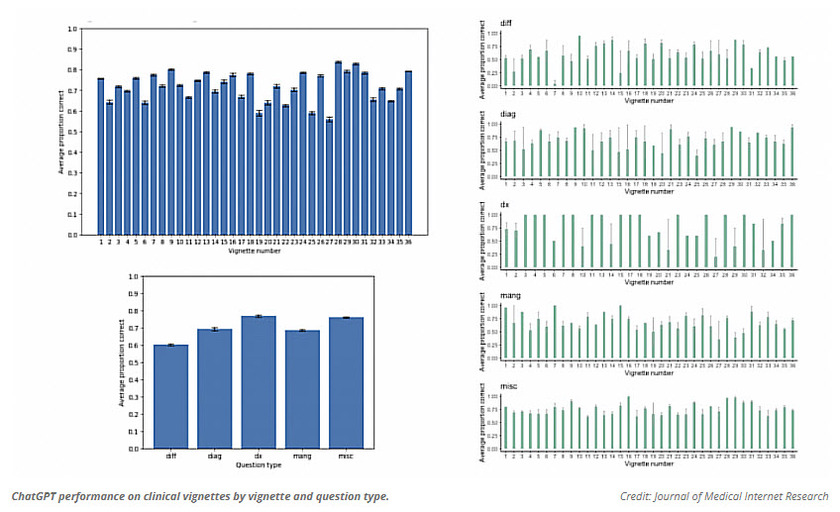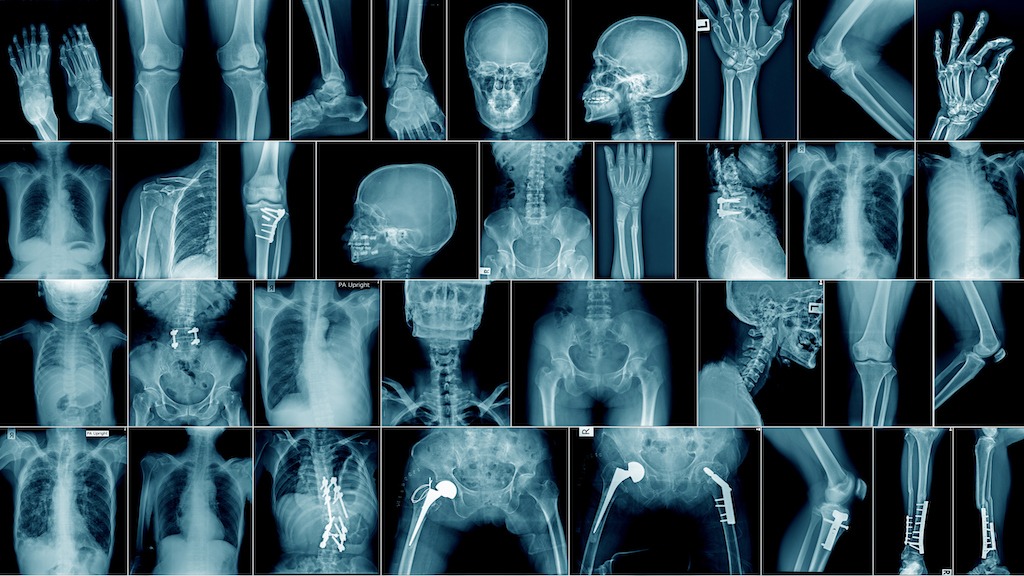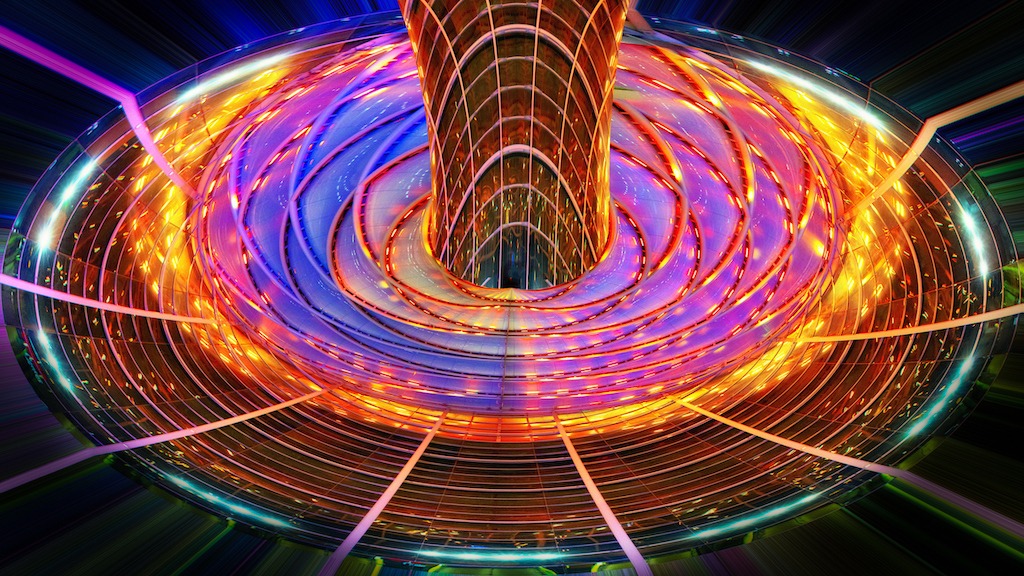I for one have lost trust in Medical Doctors due to COVID and reflection that they seem to push pills for everything and untested so called vaccines that is using a unproven technology because the Government and the Medical Boards of the State told them to. There are a very few exceptions. Thus they do not address the key problem just prescribe more and more pills to keep you alive an sick longer for them and Big Phama to profit from you. Will AI do any better? Well that depends on what was used for the training of AI. If it also pushes pills and vaccines without question then you have the same problems noted above. However, if the AI Training includes all possible forms of treatment and they zero in on the right issues for the true problem then there is possibilities they would be way better than most of the current Medical Doctors today.
The following is from an article from interestingengineering.com and written by Paul Ratner:
"A new study looks at how accurately AI can diagnose patients. We interview the researcher, who weighs in on AI's role in assisting human doctors.
Much has been made of fears for the coming age of Artificial Intelligence. While there are many potential negative outcomes, from mass unemployment and the deskilling of humans to the extreme of robots taking over, AI could also lead to dramatic improvements in many areas, including medicine.
A new study from researchers at Mass General Brigham takes a step towards figuring out how AI could aid doctors. The study looked at 36 different clinical vignettes and found that ChatGPT was nearly 72% accurate overall in clinical decision making.
The researchers, who published their results in a new paper, utilized the large-language model (LLM) artificial intelligence chatbot and observed that it did equally well in primary care and emergency environments.
The goal for the team was to understand whether ChatGPT could successfully get through a full clinical encounter with a patient, from a diagnostic checkup to making decisions on clinical management and establishing the final diagnosis.
In a press release, the paper’s corresponding author Marc Succi, MD of Mass General Brigham, equated the efficacy of the ChatGPT "doctor" to someone like an intern or a resident.
Certainly, there’s more work to be done until AI reaches the capabilities and knowledge of an experienced physician, although a recent study found doctors achieving nearly the same rate of about 71% accuracy on diagnoses. As Dr. Succi stated, their study “tells us that LLMs in general have the potential to be an augmenting tool for the practice of medicine and support clinical decision making with impressive accuracy."
How the study was conducted
The study involved pasting portions of 36 standardized and previously-published patient cases into ChatGPT. Analyzing such factors as the patient’s age, gender, symptoms, and how much of an emergency the case was, the AI was tasked with making an initial diagnoses.
After completing that step, ChatGPT received additional information and was tasked with making a final diagnosis and deciding on how to manage the patient’s. In this way, the whole process of what it would be like to see a real patient was simulated.
The researchers gave the AI points for correct answers at each stage, looking at how well it did in differential diagnosis, diagnostic testing, management, and final diagnosis. What they discovered is that ChatGPT achieved nearly 72% accuracy overall, doing its best at making final diagnoses, where its accuracy was 77%.
The AI did worst in differential diagnoses, with its accuracy dropping to only 60% when it needed to chose between two or more conditions with similar symptoms. Clinical management decisions like picking the medicine to give in each case were also not its strong suit, coming in at about 68% accuracy.
Dr. Succi shared that this relative lack of success in differential diagnosis by ChatGPT is important to note “because it tells us where physicians are truly experts and adding the most value — in the early stages of patient care with little presenting information, when a list of possible diagnoses is needed."
AI vs physician?
Interesting Engineering emailed Arya Rao, PhD candidate at Harvard/MIT and co-author of the study, for more insight on the paper.
The scientist addressed how their team would compare the accuracy of ChatGPT to human doctors by sharing that the patient vignettes they used were originally meant to test the knowledge of healthcare providers. In that regard, being 100% correct would be the "gold-standard of clinical decision making” and a baseline against how they evaluated ChatGPT's performance.
Rao explained that there are some intangible factors that are part of interacting with a human doctor. In particular, Rao stated, “the patient-doctor relationship is crucial; empathy, observation, and critical thinking are all necessary in clinical care, and none of these can be performed by GPT.” The role of AI, wrote Rao, “is to assist physicians, not replace them.”
One aspect of that assistance could be in carrying out time-consuming administrative tasks like writing notes and processing billing, taking that burden off the doctors. AI can also use its powerful data-processing capabilities to achieve greater efficiency in searching electronic health records and medical databases for data and information used to arrive at a diagnosis or treatment plan.
But will AI surpass human doctors at some point? Ultimately, Rao said, “I don't think that AI vs physicians is a fair comparison; the utility of AI is to augment physicians in their workflows."
Rao also addressed why ChatGPT struggled with differential diagnosis, explaining that ChatGPT is generally designed only to act on information it is given. To answer question on differential diagnosis, however, it was provided with less information, which could have been a factor in its efficacy. It had more data for final diagnosis questions, where it did better.
Check out the study “Assessing the Utility of ChatGPT Throughout the Entire Clinical Workflow: Development and Usability Study,” published in the Journal of Medical Internet Research.
Abstract
Background:
Large language model (LLM)–based artificial intelligence chatbots direct the power of large training data sets toward successive, related tasks as opposed to single-ask tasks, for which artificial intelligence already achieves impressive performance. The capacity of LLMs to assist in the full scope of iterative clinical reasoning via successive prompting, in effect acting as artificial physicians, has not yet been evaluated.
Objective:
This study aimed to evaluate ChatGPT’s capacity for ongoing clinical decision support via its performance on standardized clinical vignettes.
Methods:
We inputted all 36 published clinical vignettes from the Merck Sharpe & Dohme (MSD) Clinical Manual into ChatGPT and compared its accuracy on differential diagnoses, diagnostic testing, final diagnosis, and management based on patient age, gender, and case acuity. Accuracy was measured by the proportion of correct responses to the questions posed within the clinical vignettes tested, as calculated by human scorers. We further conducted linear regression to assess the contributing factors toward ChatGPT’s performance on clinical tasks.
Results:
ChatGPT achieved an overall accuracy of 71.7% (95% CI 69.3%-74.1%) across all 36 clinical vignettes. The LLM demonstrated the highest performance in making a final diagnosis with an accuracy of 76.9% (95% CI 67.8%-86.1%) and the lowest performance in generating an initial differential diagnosis with an accuracy of 60.3% (95% CI 54.2%-66.6%). Compared to answering questions about general medical knowledge, ChatGPT demonstrated inferior performance on differential diagnosis (β=–15.8%; P<.001) and clinical management (β=–7.4%; P=.02) question types.
Conclusions:
ChatGPT achieves impressive accuracy in clinical decision-making, with increasing strength as it gains more clinical information at its disposal. In particular, ChatGPT demonstrates the greatest accuracy in tasks of final diagnosis as compared to initial diagnosis. Limitations include possible model hallucinations and the unclear composition of ChatGPT’s training data set."
So with the above noted and the training is what is asked of Doctors and understanding there may be a Doctor relationship, would you trust an AI Doctor? At this point in time I would not trust either of them. I would question both their decision about pushing more and more pills and more and more vaccines without question. So how do you feel about the above? Do you you trust what your Doctor tells you without question?
Reference: https://interestingengineering.com/health/can-ai-do-better-than-doctor-new-study-diagnosis

I have lost a lot of faith with the Medical Community and the Governments over the last several years, but there are a few good things that can raise above the corruption and the pushing of drugs a new approach to heal people. The following is from www.gaia.com and written by Hunter Parsons that does not involve any drug or pushing an ineffective so called vaccine that the drug company is not held accountable in any way but they use sound! The use of sound can regrow bone tissue! Here is the story:
"The future of regenerative medicine could be found within sound healing by regrowing bone cells with sound waves.
The use of sound as a healing modality has an ancient tradition all over the world. The ancient Greeks used sound to cure mental disorders; Australian Aborigines reportedly use the didgeridoo to heal; and Tibetan or Himalayan singing bowls were, and still are, used for spiritual healing ceremonies.
Recently, a study showed an hour-long sound bowl meditation reduced anger, fatigue, anxiety, and ...
Not a fan of a Defense Agency studying Anti-Gravity and other Exotic Tech, but if the commercial world and make this technology cheap that will change our world yet again. The following is about three minute read and from www.gaia.com. The below was written by Hunter Parsons:
"Wormholes, invisibility cloaks, and anti-gravity — it’s not science fiction, it’s just some of the exotic things the U.S. government has been researching.
A massive document dump by the Defense Intelligence Agency shows some of the wild research projects the United States government was, at least, funding through the Advanced Aerospace Threat Identification Program known as AATIP.
And another lesser-known entity called the Advanced Aerospace Weapons System Application Program or AAWSAP
The Defense Intelligence Agency has recently released a large number of documents to different news outlets and individuals who have filed Freedom of Information Act requests.
Of particular interest are some 1,600 pages released to Vice News, which ...
As our technology gets better we are discovering more about the history of mankind and pushing the timeline back further and further. The following article is from www.gaia.com and written by Michael Chary that discusses this new find that changes the historical timeline:
"Over the past decade, there have been a number of archeological revelations pushing back the timeline of human evolution and our ancient ancestors’ various diasporas. Initially, these discoveries elicit some resistance as archeologists bemoan the daunting prospect of rewriting the history books, though once enough evidence is presented to established institutions, a new chronology becomes accepted.
But this really only pertains to the era of human development that predates civilization — the epochs of our past in which we were merely hunter-gatherers and nomads roaming the savannahs. Try challenging the consensus timeline of human civilization and it’s likely you’ll be met with derision and rigidity.
Conversely, someone of an alternative...
Not sure if you have heard of a show on YouTube called "The Why Files". If not you should check it out it is interesting and has some humor with it on different subjects. Last weeks was on a different theory how the Universe works and how main stream Science is attempting to shut it down like is always seems to do if it goes aguest some special interest. Today it is akin to what happened to those who questioned the Earth was the Center of the Universe that main stream so called Science all believed during the Renaissance period, They called any theory that the Earth was not the Center of the Universe misinformation. Does this sound familiar today? People laughed and mocked people like Leonardo da Vinci, Nicolaus Copernicus, Georg Purbach as crack-pots, conspiracy theorists, nut-jobs and they were suppressed and even imprisoned for their radical thoughts and observations. Again it sounds like today in so many ways. In any event this is a good one to ponder and see even if a bad idea ...
Seemingly chaotic systems like the weather and the financial markets are governed by the laws of chaos theory.
We all have heard about chaos theory, but if you have not or have forgotten what chaos theory is well here you go from interestingengineering.com:
"Chaos theory deals with dynamic systems, which are highly sensitive to initial conditions, making it almost impossible to track the resulting unpredictable behavior. Chaos theory seeks to find patterns in systems that appear random, such as weather, fluid turbulence, and the stock market.
Since the smallest of changes can lead to vastly different outcomes, the long-term behavior of chaotic systems is difficult to predict despite their inherently deterministic nature.
As Edward Lorenz, who first proposed what became commonly known as the Butterfly Effect, eloquently said, "Chaos: When the present determines the future, but the approximate present does not approximately determine the future.""
You may have heard the term about chaos theory as a butterfly flaps its wings in Brazil,...
As many may know there are a few theories out there that we are just living in a program or a simulated reality. Perhaps I should ask the developers to fix my knees and add a few million in my bank account. In any event do you believe this theory? The following is from interestingengineering.com and written by Shubhangi Dua.
"His hypothesis proposes that human encounters are artificial, resembling characters in a video game.
Imagine if we humans were just a part of a simulation in a virtual world. Elon Musk believes that humans don’t actually exist. According to The Guardian, he stated that the odds are billions to one that we are actually living in “base reality,” that is, the physical universe.
Now, Dr. Melvin Vopson, a physicist, is following up on such a theory and investigating a new law of physics to support the idea that our reality might be a computer simulation, according to a statement by the University of Portsmouth.
Human encounters are artificial
This hypothesis proposed that human encounters are artificial, ...






















